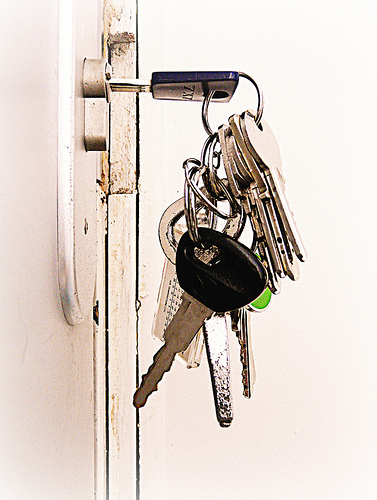As security technology has evolved over the years, home burglary has steadily decreased. In spite of the decline, the U.S. Department of Justice reported 3,394,700 home burglaries in 2011. The good news is that that number represents a decrease of 56% since 1994. The bad news is there are still a lot of break-ins, and each one, no matter the severity, is devastating to the home’s occupants. Few things make people feel more vulnerable and violated than discovering that someone has been in their homes and helped themselves to their valuables. While living in paranoia isn’t productive, it is prudent to take practical steps to protect yourself from burglary.
Hold that Mail!
As surprising as it may be, experienced criminals keep an eye on mailboxes. Several days of mail in a box is a good signal that the occupants of a possible target home are out of town.
 Image by Bogdan Siditu
Image by Bogdan Siditu
Even though it is a bit of a hassle to make the arrangements with the post office, having your mail held is definitely a big step toward theft prevention when you are away on a trip, even if that trip only spans a few days.
Don’t Post It!
“On the plane for a week in Cancun with my honey. So glad for the time away!” These words, so easily tapped out on your smart phone and posted to various social media sites, may seem like an innocent way to share the excitement of your well-deserved escape with your friends. Unfortunately, people other than your friends can view that information and use it as an invitation to enter your home while you are away, giving you a very unpleasant welcome home.
 Photo by Dave Rutt
Photo by Dave Rutt
It may be fine to share pictures of your trip after you have returned home, but play it safe and avoid advertising your absence while you are gone.
Rethink Your Hidden Keys
Although there are all kinds of contraptions, from fake rocks to flower pots with hidden compartments, made to conceal spare keys, these are not foolproof. Some homeowners even leave a spare key under their doormat.
 Photo by John Rairdon
Photo by John Rairdon
If you need to keep a spare key somewhere, choose a trusted neighbor or friend. If you get locked out of your home, these folks are likely just a quick walk or phone call away. Potential robbers know where to look for hidden keys, so your concealment strategy likely isn’t fooling anyone.
Lock Your Doors
Seriously, a surprising number of people live with their doors unlocked, even when they are not at home. This is just asking for trouble. While locking your doors when you are home may seem to be overdoing it, keeping the doors locked on a regular basis makes it a habit, one that may pay off later.
 Photo by Judy Van der Velden
Photo by Judy Van der Velden
Many thieves do not use force to enter a home; they simply find an unlocked window or door and step right in. If you are in and out of the house a lot and don’t want to carry a key, consider a combination lock on your door. This will allow you to get in when you need to but will keep your doors securely locked.
Time It
Light timers are a wonderful invention. A home that stays dark several evenings in a row is a tell-tale sign for thieves. If you are tempted to just leave one light on while you are gone, think about how often that same light is on when you are at home. Keeping a light on all of the time is almost as bad as having a dark home.
Time your lights to come on in the evening and then switch off around bedtime. Consider placing different lights on different timers. Since burglary often happens during the day while people are at work, putting a TV or a radio on a timer is another option to deter criminals by portraying that your home is occupied.

 We serve the entire Phoenix area, including
We serve the entire Phoenix area, including  We accept Cash, Checks and Major Credit Cards.
We accept Cash, Checks and Major Credit Cards.